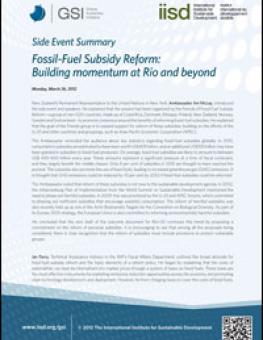
"Fossil-Fuel Subsidy Reform: Building momentum at Rio and beyond" Side Event Summary
NEW YORK - March 26, 2012 - The Friends of Fossil Fuel Subsidy Reform group and the International Institute for Sustainable Development's (IISD's) Global Subsidies Initiative (GSI) convened a side event, chaired by New Zealand, to discuss why and how fossil fuel subsidy reform could be advanced at Rio+20.
The event included ambassadors from Ethiopia, Costa Rica and Sweden, as well as speakers from the IMF and the GSI. This meeting report summarizes the discussions that took place during the side event, which largely focused on country experience, as well as the economic and social impacts of reform.
Participating experts
You might also be interested in
The Cost of Fossil Fuel Reliance
Government support for fossil fuels reached at least USD 1.5 trillion in 2023, new data shows.
Increased Support Needed to Achieve India's Clean Energy Goals
India is on track to achieve many of its 2030 clean energy goals but needs to step up government support measures to accelerate the deployment of offshore wind, electric vehicles, and green hydrogen, according to a new report.
Ending Export Credits for Oil and Gas: How OECD countries can end 2024 with a climate win
For a year now, Organisation of Petroleum Exporting Countries (OECD) governments have been negotiating an agreement that could put an end to oil and gas export finance. Following the acrimony in Baku, this would be a very real way for the OECD to show policy coherence, respond to calls from the poorest countries to stop subsidizing fossil fuels, and shift public finance to solutions.
Fossil Fuel Production, Renewable Energy, and Subsidy Reform in Nationally Determined Contributions 3.0
This policy brief provides an analysis of the critical benchmarks and recommendations necessary for aligning nationally determined contributions (NDCs) with the 1.5 °C target.